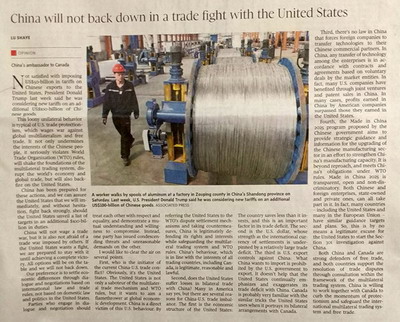【中英文对照】驻加拿大大使卢沙野发表署名文章《美国挑起对华贸易摩擦,中国不会退缩》

2018年4月9日,加拿大《环球邮报》发表驻加拿大大使卢沙野署名文章“美国挑起对华贸易摩擦,中国不会退缩”。全文如下: | On April 9, the Globe and Mail published an article of Ambassador Lu Shaye titled "China will not back down in a trade fight with the United States". The full text is as follows: | |
美国挑起对华贸易摩擦,中国不会退缩 | China will not back down in a trade fight with the United States | |
继宣布对价值500亿美元中国出口商品加征关税的清单后,美国总统特朗普上周又放言要考虑再对中国1000亿美元出口商品加征关税。 | Not satisfied with imposing US$50-billion in tariffs on Chinese exports to the United States, President Donald Trump last week said he was considering new tariffs on an additional US$100-billion of Chinese goods. | |
美方这一疯狂的举动是典型的单边主义和贸易保护主义,是对全球多边主义和自由贸易的宣战,不仅损害中国人民的利益,严重违反世贸组织规则,动摇多边贸易体制根基,冲击世界经济和全球贸易的正常发展,而且最终将损害美国自己的利益。 | This loony unilateral behavior is typical of U.S. trade protectionism, which wages war against global multilateralism and free trade. It not only undermines the interests of the Chinese people, it seriously violates World Trade Organization (WTO) rules, will shake the foundations of the multilateral trading system, disrupt the world's economy and global trade, but will also backfire on the United States. | |
中方不会坐以待毙,我们已做好充分准备。请美国放心,一旦美方公布新增1000亿美元商品征税清单,我们将毫不犹豫、立即进行强力反击。 | China has been prepared for these actions, and we can assure the United States that we will immediately, and without hesitation, fight back strongly, should the United States unveil a list of targets in an additional $100-billion in duties. | |
中方不想打贸易战,但不怕打贸易战。美方要打多久,我们就打多久,一直打到完全胜利。我们不排除任何选项,而且一定会说到做到。中方一贯主张也愿意通过对话协商解决纠纷,但对话协商应遵循国际法和国际贸易规则,而不是美国的国内法;要做到相互尊重、平等相待,而不是居高临下、单方胁迫;要体现互谅互让、有取有予的原则,而不是漫天要价、胡搅蛮缠。 | China will not wage a trade war, but it is also not afraid of a trade war imposed by others. If the United States wants a fight, we are prepared to stay with it until achieving a complete victory. All options will be on the table and we will not back down. Our preference is to settle economic differences through dialogue and negotiations based on international law and trade rules, not based on domestic law and politics in the United States. Parties who engage in dialogue and negotiation should treat each other with respect and equality, and demonstrate a mutual understanding and willingness to compromise. Instead, one party has issued condescending threats and unreasonable demands on the other. | |
在此,我想澄清几个观点。首先,谁是中美贸易冲突的始作俑者?很明显,是美国。美不仅是多边贸易体制和世贸规则的破坏者,也是给全球经济发展增添不稳定因素的煽风点火者。中国是直接受害者。中国在对美方采取反制措施的同时,将美诉诸WTO争端解决机制。中国的反应和举措恰恰是为了维护本国合法权益,捍卫多边贸易体制和世贸组织规则,合情合理合法,符合包括加拿大在内的各国和各国人民利益。 | I would like to clear the air on several points. First, who is the initiator of the current China-U.S. trade conflict? Obviously, it's the United States. The United States is not only a saboteur of the multilateral trade mechanism and WTO rules, but it wants to aim a flamethrower at global economic development. China is a direct victim of this U.S. behaviour. By referring the United States to the WTO's dispute settlement mechanisms and taking countermeasures, China is legitimately defending its rights and interests while safeguarding the multilateral trading system and WTO rules. China's behaviour, which is in line with the interests of all trading countries, including Canada, is legitimate, reasonable and lawful. | |
第二,美方在中美贸易中吃亏了吗?一些美国人认为他们吃亏了。但中美贸易出现不平衡,首先是美经济结构问题,美储蓄小于投资,这是美全球贸易逆差的重要原因。第二是美元。美必须保持比较大的贸易逆差,才能维持美元国际支付货币的地位。第三是美对华出口管制,中国想进口的东西美国不卖。此外,美方故意夸大中美贸易逆差。加拿大对美方在加美贸易中的类似伎俩一定不陌生。 | Second, does the United States suffer losses in bilateral trade with China? Many in America say yes, but there are several reasons for China-U.S. trade imbalance. The first is the economic structure of the United States: The country saves less than it invests, and this is an important factor in its trade deficit. The second is the U.S. dollar, whose strength as the international currency of settlements is underpinned by a relatively large trade deficit. The third is U.S. export controls against China: What China wants to import is prohibited by the U.S. government to export. It doesn't help that the United States continually emphasizes and exaggerates its trade deficit with China. Canada is probably very familiar with the similar tricks the United States uses when it portrays its bilateral arrangements with Canada. | |
第三,中国没有任何法律规定外国企业必须转让它的技术给中国合作伙伴。企业之间进行技术转让,完全依据契约,是市场主体自愿交易的结果。实际上,很多美国企业通过在中国设立合资企业和出售专利的方式实现了巨大收益,获取的利润甚至超过它们在美国本土的利润。 | Third, there's no law in China that forces foreign companies to transfer technologies to their Chinese commercial partners. In China, any transfer of technology among the enterprises is in accordance with contracts and agreements based on voluntary deals by the market entities. In fact, many U.S. companies have benefited through joint ventures and patent sales in China. In many cases, profits earned in China by American companies surpassed those they earned in the United States. | |
第四,中国提出“中国制造2025”计划,目的是为中国制造业的升级提供战略指引和信息指导,加强自身的制造能力建设,是无可非议的,也符合中国在世贸规则项下的义务。“中国制造2025”是透明、开放、非歧视的,中国企业、外国企业、国有企业、民营企业都可以参加。实际上美国、欧盟等很多国家都有类似的指导性规划。所以,“中国制造2025”绝不是美国对华发起301调查的正当理由。 | Fourth, the Made in China 2025 program proposed by the Chinese government aims to provide strategic guidance and information for the upgrading of the Chinese manufacturing sector in an effort to strengthen China's manufacturing capacity. It is beyond reproach, and meets China's obligations under WTO rules. Made in China 2025 is transparent, open and non-discriminatory. Both Chinese and foreign enterprises, state-owned and private ones, can all take part in it. In fact, many countries - including the United States and many in the European Union - have similar guidance targets and plans. So, this is by no means a legitimate excuse for the United States to start the Section 301 investigation against China. | |
中加两国都是自由贸易的坚定维护者,都支持通过多边贸易机制协商解决贸易争端。中方愿与加方共同努力,遏制贸易保护主义势头,维护国际多边贸易体制和自由贸易。 | Both China and Canada are strong defenders of free trade, and both countries support the resolution of trade disputes through consultation within the framework of the multilateral trading system. China is willing to work together with Canada to curb the momentum of protectionism and safeguard the international multilateral trading system and free trade. | |
(来源:驻加拿大使馆供稿) | (Source: Chinese Embassy in Canada) |


